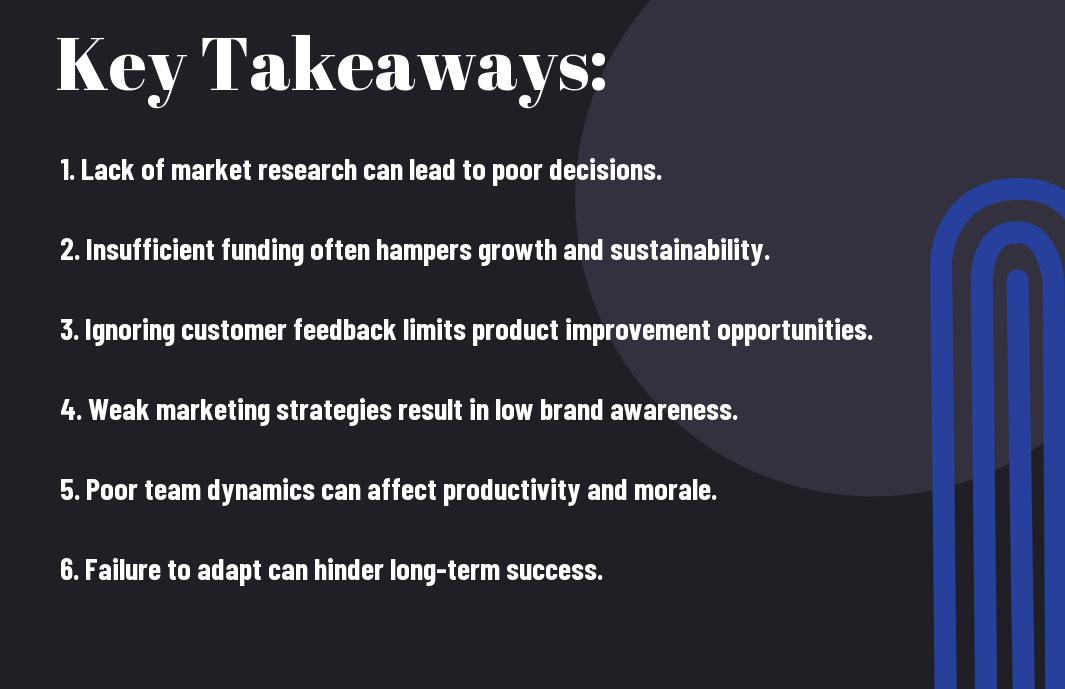
Many entrepreneurs investigate their startups with excitement, only to find that most of them fail within the first year. This often happens due to mismanagement of finances, poor market fit, or lack of a solid business plan. In this post, I will explore the reasons behind these failures and provide you with actionable strategies to enhance your startup’s chances for success. By understanding the pitfalls and taking proactive steps, you can transform your vision into a thriving reality.
Key Takeaways:
- Many startups fail due to a lack of market demand; it’s necessary to validate your idea with potential customers before fully committing.
- Running out of cash is a common issue; create a detailed financial plan and consider funding options early on to sustain operations.
- Building the right team is vital; surround yourself with individuals who complement your skills and share your vision to drive the startup forward.

Common Reasons Startups Fail
A major reason startups encounter difficulties is the lack of understanding of their target market. Without a product or service that meets real needs, entrepreneurs may find themselves pouring time and resources into ideas that simply do not resonate with consumers.
Lack of Market Demand
Market fit is crucial for any startup. If your offering fails to attract customers or solves a perceived problem, you’re unlikely to gain traction. Conducting thorough market research before launching ensures that your business fulfills an existing demand.
Insufficient Capital
Against the odds, many startups fail due to insufficient funding. Without adequate capital, you may struggle to cover expenses during the critical early stages of growth. It’s paramount to secure enough financial resources to sustain operations until your revenue stabilizes.
Lack of proper financial planning can leave you exposed to unforeseen challenges, restricting your capability to invest in marketing, hiring, or product development. To avoid this pitfall, create a detailed budget, and seek out multiple funding sources, whether through investors, loans, or grants.
Poor Business Model
Business models need to be strategically sound to ensure profitability. If your model does not outline a clear path to revenue or relies too heavily on uncertain variables, you may find yourself unable to sustain operations in the long term.
But a robust business model can mean the difference between failure and success. I recommend assessing your revenue streams, customer acquisition costs, and potential scalability. Without a plan that effectively aligns with market demand, you’re setting yourself up for failure.
Inexperienced Team
Beside the lack of market understanding, an inexperienced team can lead to poor decision-making and execution. If your team lacks crucial skills or expertise, your startup may struggle to compete and innovate effectively.
In fact, having a well-rounded team that combines diverse experiences is vital. Strong leadership, industry knowledge, and operational know-how can propel your startup forward. Without the right people in place, even the best ideas can falter. Strengthen your team by hiring strategically and leveraging mentorship opportunities to build a solid foundation for your venture.

Importance of Market Research
All successful startups prioritize market research to understand their competitive landscape and customer preferences. This research is crucial, as it enables you to make informed decisions about your product, target audience, and marketing strategies. By engaging in thorough market research, you can significantly increase your chances of success while avoiding common pitfalls that lead to early failures.
Identifying Customer Needs
On your journey to establishing a startup, it’s vital to focus on identifying customer needs. Conducting surveys, interviews, and analyzing customer feedback can provide valuable insights into what your target audience truly values. By understanding their pain points and desires, you can tailor your offerings to meet those needs more effectively, enhancing your chances of success.
Validating Business Ideas
Above all, validating your business ideas is a significant step to ensure you’re on the right track. Engaging with potential customers and assessing their reactions can provide you with a clearer picture of whether your concept is viable.
Hence, validation helps you mitigate risks associated with launching a startup. You should consider creating a minimum viable product (MVP) to test your ideas in real market conditions. Gathering feedback during this phase allows you to refine your product and identify any necessary adjustments before a full launch. Understanding market response not only strengthens your business model but also builds confidence in your venture, enhancing your ability to secure funding or attract partnerships.
Financial Management Strategies
For any startup, mastering financial management strategies is important for survival in the competitive landscape. I see countless businesses struggle due to ineffective budgeting or a lack of clear financial oversight. By implementing consistent financial practices, you can avoid common pitfalls and ensure that your startup remains on a path toward growth and sustainability.
Budgeting and Forecasting
Budgeting is the foundation of strong financial management. I encourage you to create a detailed budget that outlines your projected income and expenses. This exercise not only helps you allocate resources efficiently but also allows you to track your growth and adjust your strategy as needed. By forecasting future sales and costs, I help you prepare for uncertainties and avoid potential financial crises.
Fundraising Options
After securing your budget, it’s time to explore various fundraising options to fuel your startup’s growth. Understanding the landscape of financing can be overwhelming, but I find that a well-organized approach can make it manageable. Options range from traditional bank loans to angel investors, venture capital, crowdfunding, or bootstrapping. Each has its own set of pros and cons, and knowing what aligns with your vision is key.
Considering these options carefully is important for your startup’s success. For instance, while bootstrapping allows you to maintain full control, it can limit growth due to resource constraints. On the other hand, venture capital can provide significant funding but may come with high expectations and loss of equity. I believe the right mix of financing depends on your business goals and risk tolerance. Always conduct thorough research to fully understand the implications of each option and choose the avenue that best supports your unique journey.
Building the Right Team
Now, having the right team is vital to the success of your startup. It’s not just about filling positions; it’s about finding individuals who align with your vision and can contribute to creating a thriving business environment. A strong team not only drives productivity but also fosters innovation, helping your startup stand out in a competitive market.
Recruiting Talents
Right from the beginning, you need to focus on recruiting top talents who share your passion and drive. Look for individuals with diverse skill sets and a willingness to adapt as your startup evolves. Effective recruitment means identifying not just qualifications but also the values that align with your mission.
Establishing a Strong Company Culture
Beside recruiting the right talents, establishing a strong company culture is necessary for your startup’s long-term success. Your culture shapes how your team communicates, collaborates, and ultimately, how they work towards shared goals.
Also, I’ve found that a positive company culture fosters engagement and loyalty among team members. To build this culture, prioritize open communication, inclusivity, and continuous feedback. Encourage a collaborative environment where everyone feels valued, and watch as creativity and productivity soar. Keep in mind that culture is not static; it requires regular nurturing to adapt and grow with your team, ensuring that everyone is aligned and motivated to push the startup forward.
Effective Marketing Techniques
After launching your startup, effective marketing becomes important for survival and growth. To stand out in a crowded market, it’s important to utilize innovative strategies that resonate with your target audience. I encourage you to explore various marketing approaches, from social media engagement to content creation, that can bolster your brand’s presence and drive sales.
Understanding Target Audience
At the core of any successful marketing strategy is a deep understanding of your target audience. I’ve discovered that identifying who your ideal customers are, including their preferences and behaviors, will allow you to tailor your messaging effectively. By segmenting your audience, you can create personalized campaigns that truly speak to their needs, increasing the likelihood of engagement and conversion.
Leveraging Digital Marketing
Any startup can benefit significantly from leveraging digital marketing tools and platforms. Utilizing social media, email campaigns, and search engine optimization can amplify your reach and impact. I’ve seen startups thrive by embracing these tactics to connect with their audience, build community, and drive sales.
Marketing through digital channels can yield remarkable results, and it’s not just about visibility; it’s about engaging your audience meaningfully. Utilizing social media platforms allows you to interact with potential customers in real-time, fostering a connection that traditional marketing often lacks. By employing strategies such as SEO, you can increase organic traffic to your website, making it easier for potential customers to find you. Plus, data analytics within digital marketing helps you track your efforts, making it easier to adjust your strategies based on what works best for your specific audience. Embrace these tools, and you can significantly boost your chances of success.
Adapting to Change
Many startups face unexpected challenges, requiring a willingness to adjust and adapt. The ability to pivot quickly can often be the difference between success and failure in those critical first 12 months. By being flexible and open to new possibilities, you can navigate obstacles effectively and guide your startup toward long-term viability.
Embracing Feedback
Among the most valuable assets you can possess is the ability to listen to feedback. Engaging with customers and team members allows you to understand their perspectives, helping you identify areas for improvement. By actively seeking and integrating this feedback, you’re not only enhancing your product but also building a loyal community around your brand.
Pivoting Business Strategies
Beside being open to feedback, I understand that sometimes you need to reconsider your entire approach. Adapting your business strategy can feel daunting, but it’s often a necessary step. Due to rapid market changes or shifts in consumer preferences, successful entrepreneurs know when to pivot. Staying alert to these signals ensures you can embrace new opportunities. Thinking too rigidly about your original plan can be detrimental. Adjusting your strategies based on real-time data can lead to fresh possibilities and ultimately a stronger position in the market. Monitoring outcomes and being ready to switch gears could very well save your startup from failure.
To wrap up
Taking this into account, I understand that most startups encounter obstacles that can lead to failure within their first year. By being aware of these challenges, such as inadequate funding, lack of market research, and ineffective marketing strategies, you can proactively address them. I encourage you to continually educate yourself, gather feedback, and adapt your business model to meet the demands of your target audience. With careful planning and resilience, you can position your startup for success and increase the likelihood of longevity in the competitive marketplace.
Leave a Reply